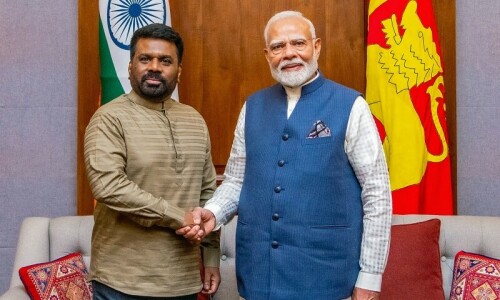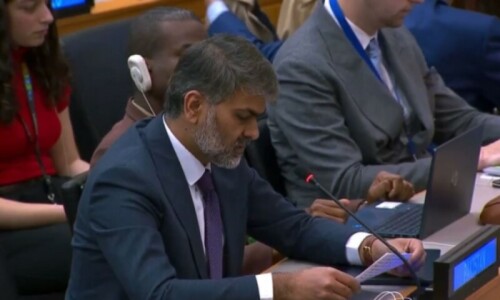AS an extreme summer engulfs the Indo-Gangetic plane, the political temperature is also rising. The Indian defence minister’s extraordinary statement about “fighting terror with terror” amounts to an open admission of India’s role in sponsoring terrorism in Pakistan and confirms the Pakistan Army’s accusation of India’s role in the Balochistan insurgency. The Pakistan army chief’s remarks calling for a solution for Kashmir on the basis of UN resolutions was an obvious reminder that India should not forget its own vulnerabilities.
India’s pronouncements have become increasingly strident. The Indian foreign minister has reiterated the refusal to resume a dialogue with Pakistan unless India’s preconditions are met. The defence minister, apart from the terror gaffe, has revived the far-fetched concern about Pakistan’s nuclear weapons being captured by extremists, in this case by the largely absent extremists of IS or the ‘Islamic State’. Indian officials have also floated the ludicrous claim that Saudi Arabia intends to buy nuclear weapons “off the shelf” from Pakistan. Notably, India launched a protest with China regarding the plan for an ‘economic corridor’ from Gwadar to Khunjerab.
The reasons for the escalating Indian rhetoric against Pakistan are not far to find. First, India is frustrated that Pakistan has not wilted under the pressure New Delhi hoped to generate by cutting off talks and ‘isolating’ Pakistan by its ‘terrorism’ accusations. On the contrary, Pakistan has evolved a more normal relationship with the US, obtained a major strategic commitment from China and opened a new chapter with Afghanistan.
Read: Pakistan and Kashmir are inseparable: General Raheel Sharif
Second, India is concerned that a Pakistan-Afghan normalisation will neutralise the western front India opened against Pakistan (through its support for the Balochistan Liberation Army insurgency and secret sponsorship of the Tehreek-i-Taliban Pakistan) and reduce Indian influence in Afghanistan. India worked hard with its friends in Kabul to generate opposition to President Ghani’s outreach to Pakistan and the putative deal for Kabul to act against the BLA and the TTP while Pakistan works to promote reconciliation between Ghani and the Afghan Taliban. India has had partial success. President Ghani visited India and has lately voiced discontent with Pakistan. Kabul’s cooperation against the BLA and the TTP also appears to have slowed down. The Pakistan Army’s open allegation of India’s role in Balochistan was also addressed to Kabul.
India is frustrated that Pakistan has not wilted under the pressure New Delhi hoped to generate.
Third, India opposes China’s rising role in the region, including in Afghanistan, and particularly its renewed strategic and economic commitment to Pakistan illustrated by the China-Pakistan Economic Corridor initiative. The realisation of this plan would be a major setback to India’s desire to dominate South Asia and isolate Pakistan.
Fourth, domestically, Modi’s ‘shine’ appears to be fading. So far, he has not delivered jobs or improved the lives of the poor. The BJP’s defeat in the Delhi elections to the Aam Aadmi party displayed its slide in popularity. Pakistan-bashing is the standard technique used by Indian governments to revive flagging domestic support. This is, of course, second nature to the extremists of the BJP and the Rashtriya Swayamsevak Sangh. Besides Modi, the defence minister, national security adviser and the RSS-linked army chief appear all too eager to prove their credentials to their core constituency.
It is difficult to predict how far India’s ‘fighting talk’ will remain just talk or escalate into another crisis with Pakistan. Unfortunately, there are no modalities in place between India and Pakistan for crisis prevention. There are several scenarios in which the two nuclear powers could find themselves engaged in a dangerous confrontation.
Also read: India killing ‘terrorists’ in surgical strikes, says minister
It seems certain that, following China’s commitment to CPEC, India ( and others) may see the fostering of violence in Balochistan not only as pressure point against Pakistan (to ensure its ‘good behaviour’ in Kashmir), but also as a means to prevent China’s direct access to the Arabian Sea, the Persian Gulf and West Asia. Indian (and other) mischief in Balochistan and other parts of Pakistan may escalate. President Ghani may be persuaded not to cooperate with Pakistan in eliminating the support base of the insurgency in Afghanistan. If Pakistan’s counter-insurgency measures in Balochistan are not successful, Kashmir may be brought back into the equation, setting the stage for another India-Pakistan confrontation.
A Kashmir crisis is possible, even without Pakistan’s intervention. The BJP government’s policies in Kashmir — settling Hindus in the Valley, eroding India-held Kashmir’s special status and continued suppression of dissent — have already provoked widespread protest from Kashmiri Muslims. A new Kashmiri revolt is probable. It would evoke popular support in Pakistan, leading to another India-Pakistan crisis.
The spark for such a crisis may be lit by another terror attack in India. Given the anti-Muslim postures of the BJP-RSS government, Muslim militancy is likely to manifest itself more strongly in India. Terror groups, like Al Qaeda or IS, have already declared their intention to instigate such terror attacks. India’s Pavlovian reaction would be to blame Pakistan.
Any one of these scenarios can lead to a disastrous conflict. While India may feel tempted to test its ‘limited war’ concept, Pakistan would operate under the assumption that India’s ‘Cold Start’ doctrine (of sudden and massive attack) is operational. A major military engagement is likely to rapidly involve a missile exchange, with Pakistan seeking to break up large Indian formations, and India responding with attacks on command centres and strategic assets. Since most missiles and aircraft are ‘“dual capable’ (they can be armed with conventional or nuclear weapons), the danger of a conflict escalating to the nuclear level is extremely high.
The destiny of billions cannot be left in the hands of leaders motivated by religious and historical antagonisms or to hope and chance. Over almost 70 years, India and Pakistan have been unable to resolve their disputes rationally. The international community, especially the major powers, must play a more active and responsible role in preventing another war whose catastrophic consequences could reverberate far beyond South Asia.
The writer is a former Pakistan ambassador to the UN.
Published in Dawn, June 7th, 2015
On a mobile phone? Get the Dawn Mobile App: Apple Store | Google Play












































